Est-ce que les personnes hypersensibles font de la synesthésie ? C’est la grande question qu’on va se poser aujourd’hui. L’enjeu est simple : si l’hypersensibilité et la synesthésie sont liées, alors ça permettrait d’expliquer beaucoup de ces mélanges sensoriels que des hypersensibles me disent ressentir. Heureusement, j’ai trouvé quelques recherches scientifiques pour nous aider.
Je m’appelle Paul, et mon HPI a été détecté il y a plus de dix ans maintenant. Sur Connect The Dots, je partage ce que j’ai appris pour aider les petits nouveaux.
NB : cet article est la transcription de la vidéo ci-dessus
C’est quoi la synesthésie ?
Avant d’aller plus loin on va essayer de comprendre ce qu’est la synesthésie. J’ai sorti la définition du Robert. C’est un « trouble de la perception dans lequel une sensation supplémentaire est ressentie dans une autre région du corps que celle qui est perçue normalement ».

En gros, on va avoir nos sens qui se mélangent. On entend des couleurs, on voit des musiques, etc. Donc ces deux sens ce qui a priori ne sont pas liés se déclenchent sur la même chose.
Alors personnellement la synesthésie je la connaissais mais depuis un autre phénomène. Enfin j’avais vu des études dessus depuis un autre phénomène. C’est ce qu’il se passe lorsqu’on consomme quelque chose qui est assez connu mais que je vous déconseille beaucoup et que je ne peux pas citer sinon Google va me gronder.
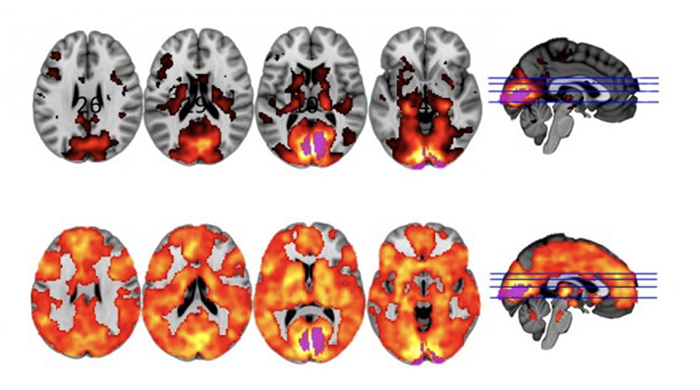
Dans ces IRM par exemple en haut on voit le cerveau de quelqu’un qui a pris un placebo, et en bas on voit le cerveau de quelqu’un qui a pris cette Mystérieuse-Substance-Dont-On-Ne-Doit-Pas-Prononcer-Le-Nom. On peut remarquer que le type en bas a l’air d’être en plein voyage à l’autre bout du monde !
Mais ce que la recherche remarque surtout, c’est que le cerveau s’active entièrement. On voit en bas qu’il est complètement en feu lorsqu’il y a juste une sensation qui s’active. Par exemple juste lorsqu’on touche la personne tout son cerveau partait en folie. Ça ne faisait pas qu’activer l’endroit du cerveau qui gère la sensation de toucher. On parle aussi de la partie responsable de l’ouïe, de l’odorat, de la vue et également la partie des émotions. On est bien dans cette histoire de synesthésie ou un sens va réveiller tous les autres. Mais vous allez me dire « Super tout ça Paul, mais pourquoi est-ce que tu nous en parles ? ».
Le fonctionnement de l’hypersensibilité
Eh bien en fait, en surfant sur internet, je suis tombé sur une étude de 2011 qui a été réalisée par l’Université d’Oxford (rien que ça !). Cette étude fait un lien qui m’a troublé et dont je voulais vous parler. On le sait, l’hypersensibilité (pour simplifier) c’est le curseur du cerveau qui est très bas et qui réagit très vite. Si vous voulez, notre seuil minimal de stimulation est très bas par rapport aux neurotypiques (leur seuil va être plus haut).
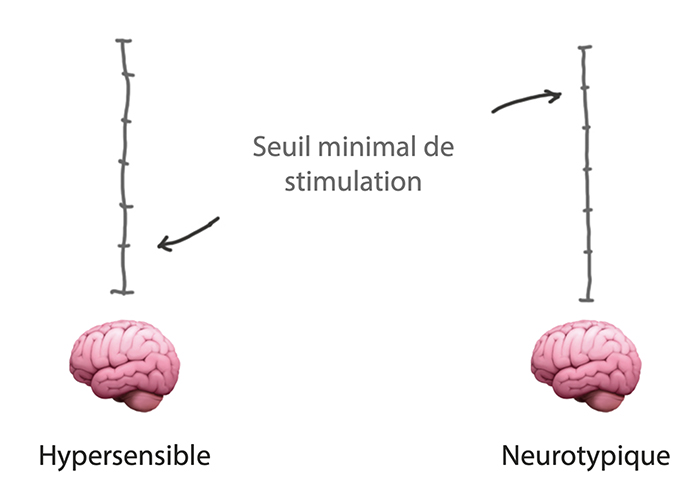
Par exemple, en dessous, en rouge, c’est une stimulation. Elle est très basse et ni l’hypersensible ni le neurotypique ne va la capter.
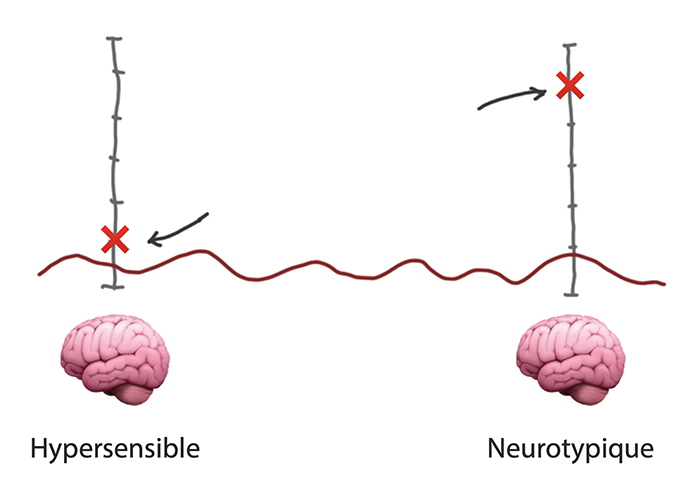
Par contre, là elle est un peu plus grande et l’hypersensible va la capter – mais toujours pas le neurotypique.
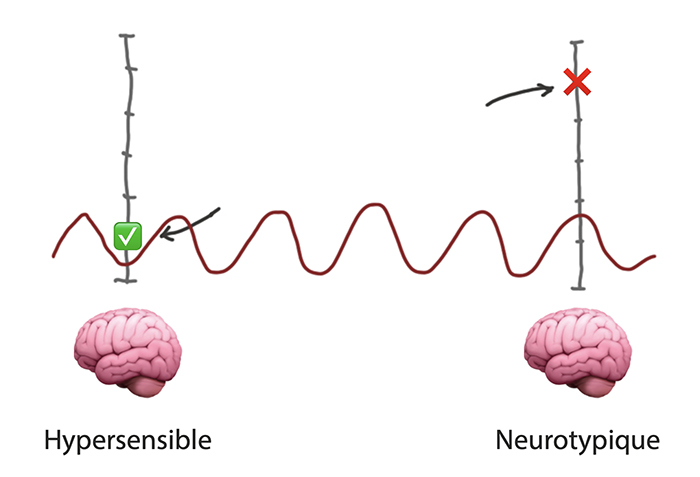
C’est pour ça d’ailleurs qu’on dit souvent que les hypersensibles captent plus de choses que les autres. En fait leur seuil est plus bas. Donc toutes les infos émotionnelles sont captées par l’hypersensible et pas le neurotypique. Là par contre cette stimulation est assez grande pour que tout le monde la capte.
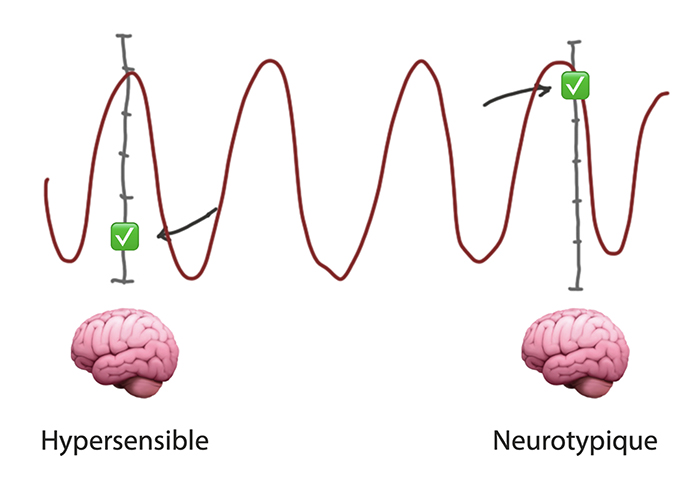
Découverte de la synesthésie
Maintenant revenons sur la synesthésie. Les scientifiques d’Oxford ont comparé des synesthètes (les personnes qui font de la synesthésie) et des neurotypiques. Ils ont découvert (je vous le simplifie énormément) que les synesthètes avaient un niveau d’excitabilité dans le cortex visuel qui est plus élevé. En gros, il faut moins de stimulation pour que cette partie du cerveau s’active. Ça ne vous rappelle rien ?

Plus le seuil minimal de stimulation monte, moins les personnes font de synesthésie.

Voilà, je ne sais pas si vous voyez le lien. Moi j’ai trouvé que ça se ressemblait beaucoup. Je me suis dit qu’il se passait quelque chose et j’ai voulu en parler.
Conclusion : quel est le lien entre synesthésie et hypersensibilité ?
Mais restons calmes : pour le moment il n’y a pas de preuve qui dit que les deux sont liées. C’est juste moi qui ai vu des similitudes alors je les pointe.

D’ailleurs vous noterez des similitudes (je pense) entre les IRM qu’on a vues au début et d’autres que je vous montre parfois sur l’hyperactivité cérébrale des hauts potentiels intellectuels.
Aussi il faut faire attention parce que la synesthésie est régulièrement confondue avec l’hyperesthésie. La synesthésie ce sont les sens qui se mélangent. L’hyperesthésie c’est globalement les sens qui sont plus forts, ou qu’on capte plus facilement. Il faut faire attention à ne pas mélanger les deux.
Aujourd’hui la recherche est incomplète. On va laisser le temps aux scientifiques de faire leur boulot. Personnellement, j’ai trop hâte ! En tout cas dès que ça arrive je vous tiendrai au courant dans la Chronique que je fais chaque mardi (inscription en bas de page). J’envoie un e-mail gratuit à ceux qui le souhaitent dans lequel je parle des actualités de l’hypersensibilité et du haut potentiel. Je donne aussi des techniques pratiques pour vivre tout ça au mieux. N’hésitez pas à nous rejoindre ! On est une communauté de plusieurs milliers de personnes, vous verrez c’est super sympa !
À la prochaine !
Sources
University of Oxford, (Science Daily), Synesthesia linked to a hyper-excitable brain, 2011.
